2025 Tax Reform – “The One Big Beautiful Bill” Simplified
As part of a sweeping new proposal making its way through Congress, the “One Big Beautiful Bill” outlines a series of tax changes that could significantly impact both individuals and business owners beginning in Tax Year 2025.
At CAPATA, we’ve summarized the key provisions and how they differ from current tax law so you can stay ahead of what’s coming. Here’s a detailed breakdown:
Bonus Depreciation
What it is: A tax incentive that allows businesses to deduct the cost of new equipment upfront rather than over several years.
- Current Law: Businesses can deduct 40% of the cost of certain new equipment in the first year.
- Proposed Change: Businesses would be allowed to deduct 100% of equipment costs upfront — all in year 1. This gives companies a faster tax benefit for investing in equipment.
R&D Expensing (Section 174)
What it is: A tax incentive that allows businesses to deduct the cost of new equipment upfront rather than over several years.
- Current Law: Businesses can deduct 40% of the cost of certain new equipment in the first year.
- Proposed Change: Businesses would be allowed to deduct 100% of equipment costs upfront — all in year 1. This gives companies a faster tax benefit for investing in equipment.
Standard Deduction
What it is: A flat-dollar deduction that reduces your taxable income.
- Current Law: $15,000 for single filers, $30,000 for married couples.
- Proposed Change: Increases to $16,000 (Single) and $32,000 (Married) — helping reduce taxes for most individuals.
Child Tax Credit
What it is: A credit that helps reduce taxes for families with qualifying children.
- Current Law: $2,000 per qualifying child.
- Proposed Change: Increases to $2,500 per child, offering greater support to families.
Manufacturing Deductions
What it is: A special deduction for companies investing in buildings used for manufacturing.
- Current Law: No specific deduction exists.
- Proposed Change: Allows 100% expensing of manufacturing structures, encouraging domestic production and facility investment.
No Tax on Tips and Overtime
What it is: A provision allowing workers to exclude tips and overtime from taxable income.
- Current Law: Tips and overtime are taxed like regular income.
- Proposed Change: Tips and overtime would be deductible for workers earning up to $160,000, providing relief for service and hourly employees
Auto Loan Interest Deduction
What it is: A tax break for interest paid on car loans — with conditions.
- Current Law: There’s no deduction for car loan interest.
- Proposed Change: Deduct up to $10,000 in interest on loans for U.S.-assembled vehicles. Phases out for incomes over $200,000 (married) and $100,000 (single).
Adoption Credit
What it is: A tax credit that helps families offset the cost of adopting a child.
- Current Law: Up to $17,280 can be claimed as a non-refundable credit (reduces your tax, but you don’t get a refund if you owe nothing).
- Proposed Change: You can still claim up to $17,280, but $5,000 is now refundable — so you can get money back even if you owe little or no tax.
Deductions for Seniors
What it is: An extra deduction for taxpayers age 65 and over.
- Current Law: $1,600 added to the standard deduction for those 65+.
- Proposed Change: Increased by $4,000 to total $5,600, with phaseouts starting at $150,000 (married) and $75,000 (single).
1099-K Threshold
What it is: A tax form for reporting income received through third-party payment apps like Venmo, PayPal, or eBay.
- Current Law: You receive a 1099-K if you earn more than $2,500.
- Proposed Change: Threshold increases to $20,000 and more than 200 transactions, helping small sellers and casual users avoid unnecessary tax forms.
State and Local Tax (SALT) Deduction
What it is: A deduction for state and local income or property taxes paid.
- Current Law: Capped at $10,000.
- Proposed Change: Raises the cap to $40,000, phasing out for incomes above $500,000.
199A / Pass-Through Deduction
What it is: A deduction for income earned by small businesses structured as pass-through entities like LLCs, S-Corps, and partnerships.
- Current Law: Eligible businesses can deduct 20% of qualified business income.
- Proposed Change: Increases to a 23% deduction, offering a larger tax break to small business owners.
As of June 3, 2025, this bill has passed the House and is under review by the Senate. While final details may still change, this gives a strong preview of what’s ahead.
If you have questions about how these changes could impact your personal or business finances, we’re here to guide you every step of the way
Tax reform simplified—made clear by CAPATA.




